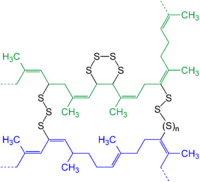
Photo from wikipedia
The synthesis of protein-polymer conjugates usually requires extensive and costly deoxygenation procedures, thus limiting their availability and potential applications. In this work, we report the ultrafast synthesis of polymer-protein bioconjugates… Click to show full abstract
The synthesis of protein-polymer conjugates usually requires extensive and costly deoxygenation procedures, thus limiting their availability and potential applications. In this work, we report the ultrafast synthesis of polymer-protein bioconjugates in the absence of any external deoxygenation via an aqueous copper-mediated methodology. Within 10 min and in the absence of any external stimulus such as light (which may limit the monomer scope and/or disrupt the secondary structure of the protein), a range of hydrophobic and hydrophilic monomers could be successfully grafted from a BSA macroinitiator, yielding well-defined polymer-protein bioconjugates at quantitative yields. Our approach is compatible with a wide range of monomer classes such as (meth) acrylates, styrene, and acrylamides as well as multiple macroinitiators including BSA, BSA nanoparticles, and beta-galactosidase from Aspergillus oryzae. Notably, the synthesis of challenging protein-polymer-polymer triblock copolymers was also demonstrated, thus significantly expanding the scope of our strategy. Importantly, both lower and higher scale polymerizations (from 0.2 to 35 mL) were possible without compromising the overall efficiency and the final yields. This simple methodology paves the way for a plethora of applications in aqueous solutions without the need of external stimuli or tedious deoxygenation.
Journal Title: Biomacromolecules
Year Published: 2022
Link to full text (if available)
Share on Social Media: Sign Up to like & get
recommendations!